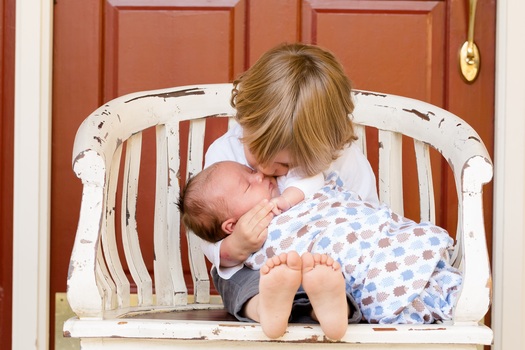
Your toddler will have lots of mixed emotions about the arrival of a new baby – from excitement and pride, to fear and anger. If your toddler was your first child, she is used to being an only child and the centre of attention.
If she’s not the oldest she will have got used to being the baby of your family. Now she’s about to be usurped by an arguably cuter new model – judging by the attention the arrival of her new brother or sister elicits in the adults in her life. She’s been your baby her entire life and has never known anything else.
The change for her when a new baby arrives will be nothing short of monumental – someone once described it as like not only finding out that your partner is having an affair but that his mistress is moving in for life. I don’t say this to panic you but to prepare you for when your toddler displays a less than loving reaction to their new baby brother or sister.
That is – it’s absolutely normal and understandable behaviour!
Each toddler will react differently. This will depend on her temperament, the family dynamics and the age gap between her and the new baby. Even if your toddler doesn’t behave in a particularly negative way they might feel a whole raft of negative emotions that they will struggle to articulate including:
Although your toddler will have a very strong inner emotional world she cannot yet articulate and express how she’s feeling, so don’t be surprised if she displays some behaviour that hints at her inner ‘turmoil’. Classic sibling jealousy behaviours include:
The good news is that with your help and the help of everyone around you these natural feelings will pass rather than become an ongoing problem.

There is a lot you can do to help your toddler feel ready and positive about your baby’s arrival:
New mums with a toddler at home can feel torn and upset if they remain in the hospital for longer than a day or so. If your baby is in NICU or SCUBU have your toddler visit you frequently in the hospital and, if appropriate, meet the baby.
Use the visit to allow the person who brought your toddler along to cuddle the new baby. This means you can spend this precious time with your toddler. Obviously, you may need to feed your newborn but try to have your toddler as the centre of your attention.
Your toddler will probably be more excited to see you than the new baby when you return from the hospital. She may have never spent a night without you before and will need a big reunion and lots of reassurance. Try to have Grandma or someone else bring the baby inside so you can get down to your toddler’s level and reunite.
This may take several minutes, and when you judge the time to be right, you can introduce your baby to your toddler, e.g., this is your big sister and then ‘show’ the baby to your toddler, so she is the focus of the interaction (your baby won’t care either way).
As your toddler gets used to the new baby, remember she is little and egocentric so put your baby in the context of your toddler, e.g., show them photos of your toddler as a newborn, exclaim that you both have the same nose. Explore the baby together in a loving and gentle way, e.g., ask your toddler to count how many toes her new baby brother or sister has. In general, try and relate as much as you can to them.
In a survey carried out by Essential Parent, 90% of parents lived over 10 miles away from their extended family and the average age gap between children for those that had more than one child was around two years.
All new mums need lots of support from family and friends. This is, even more, the case if you have a toddler too so try to have family and friends help. If it’s a favourite aunt, your toddler will be thrilled if they can go out on a trip with them. Similarly, it can help if you get a family member to occasionally look after the baby while she naps during the day so that you can take your toddler out or just have some special time with her. This will only be possible if someone can come over at short notice and just as quickly call you back if your baby wakes up and needs a feed. However, if this is possible just popping out to the park or playing in the garden can be a lovely one-to-one experience.
Remind visiting family and friends that it will help your toddler if they don’t go all gooey eyed over the baby and ignore your toddler in the clamour to see the new baby.
Ask close friends and family to bring a little gift for your toddler, especially if they are planning to come armed with presents for the baby.
All these suggestions will help to make this transition with the new baby smoother and more joyful. However, you will need to be prepared for some sticky moments with your toddler, and this is just a sign that she loves you and cherishes the bond she has with you to her very core. This may be difficult to remember when you are on the receiving end of tantrums, bad behaviour and babyish regressions. Your toddler will suddenly feel very big and grown up compared to your brand new baby but they are still a baby inside, and they need lots of reassurance, patience, cuddles and unconditional love.

It is very common that your first child will graduate to toddlerhood around the time you have a new baby. Age gaps of between 12 and 36 months are very common. This means that you don’t just have a toddler to contend with but a baby too. It’s exhausting even to think about meeting the needs of these two uniquely needy phases of life. I salute all parents simultaneously looking after a babe in arms and a toddler round the ankles.
In fact, close age gaps would probably have been much rarer in our Palaeolithic past because longer exclusive breastfeeding (until 2-4 years) would have exerted a natural contraceptive effect.
I think that toddlers benefit from having a baby brother or sister around. Life slows down with a baby and toddlers are much less scheduled. Whilst both you and your toddler will at times be frustrated by the added needs of your new baby, you can learn to be very good at looking after both children. For example, you can learn to breastfeed with the rugby hold so you can share a book with your toddler.
What you lose in energy you can make up for in losing that focus on one child. This tends to materialise as a more relaxed attitude to your children. For example, I think ‘Baby-Led Weaning’ could be renamed ‘I have a newborn baby’ weaning. Gone are the perfect lump free purees introducing different vegetables every 72 hours, replaced by mountains of crushed potatoes and greens plonked on your toddler’s plate.
With a toddler and a baby, you will sometimes feel like you need to clone yourself so that you can, e.g., give your baby a massage and a feed and cuddle and read your toddler a story at bedtime. It’s exhausting.
I recommend an ‘order of events’ routine around these pressure points in the day and also teamwork with your partner. Try to start these routines at the same time every day. It just makes everything easier for you and easier to process and learn for your toddler. Routines also always need to go in the same order – that fast tracks the understanding for your toddler and reassures them.
Toddlers do not need hundreds of scheduled events like swimming and ballet class to thrive. A slow walk, chatting to you and holding your hand, with your baby sleeping in a soft sling will be probably more enriching and compelling to them.